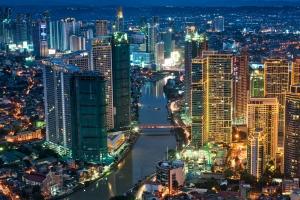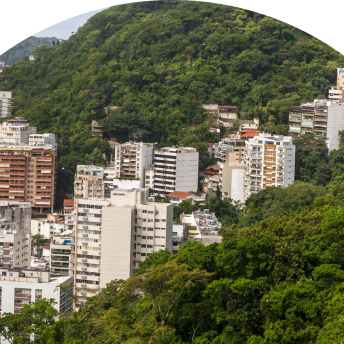PHP
114.60 million
871.56 billion
95th RANKED
Filipino
biweekly
Grow your team in the Philippines
We make hiring in the Philippines simple by managing your supported employees’ onboarding, payroll, taxes, immigration, and benefits.
Benefits of hiring in the Philippines
The Philippines is located in Asia, the world’s fastest-growing region. The country is a pivotal entry point to more than 500 million in the ASEAN (Association of Southeast Asian Nations) market. The Philippines is a major intersection of eastern and western business and operates as a gateway for international shipping.
The Philippines’ population is the twelfth-largest in the world, with over 100 million people, where half of the population is under the age of 25, professionally qualified, and fluent in English. The Filipino workforce is highly attractive for international business.
The Philippine government permits 100% foreign ownership in almost all sectors. The government has deregulated many of the country’s top sectors to remove monopoly structures, allowing foreign companies unlimited business opportunities.
The Philippines has a developed communication, transportation, and economic infrastructure which connects the country’s three major islands. Accessible by water, air, and cyberspace, inter-island transport has high efficiency for traffic and goods.
The Philippines is a major intersection of eastern and western business and operates as a gateway for international shipping.
Philippine bureaucracy can be dense when doing business. There are 16 different procedures for starting a business, which takes about 36 days, and property registration takes an additional 39 days. The Philippines is known for often burdensome business processes.
The Philippines ranks poorly by the World Bank on all indices for investor protection and ease of getting credit.
Paying taxes in the Philippines is a laborious endeavor, as businesses are required to make 47 tax payments each year which average almost 200 business hours.
Levels of corruption are high in the Philippine government, and it restricts business efficiency. Bribery and unclear, complicated laws make foreign businesses unprotected from extortion and manipulative influence by public officials. Favoritism is widespread in the legal system, creating an uncertain business environment.
Paying taxes in the Philippines is a laborious endeavor, as businesses are required to make 47 tax payments each year which average almost 200 business hours.
Filipino business culture is relationship-oriented. A third-party introduction is beneficial since Filipinos prefer to engage with colleagues they know and trust. Networking is purposefully done because personal contacts are pivotal to success.
Decision-making is done by colleagues in highly ranked positions. The colleague of the highest rank approves all decisions, but group agreement is still gathered and received. Expect slow negotiations as Filipinos respect checking in with all colleagues on decision-making matters.
Punctuality is heavily respected. Business-related endeavors are always on time.
Networking in the Philippines is purposefully done because personal contacts are pivotal to success.

Hiring in the Philippines
In the Philippines, there is no statutory requirement to have a written employment contract. Likewise, there is no law that lists in detail the required terms in an employment contract.
-
Probationary periods in the Philippines
According to Article 281 of the Philippine Labor Code, the maximum length of a probationary period is six months.
-
Bonuses in the Philippines
Discretionary bonuses are at the directive of the employer, and they are not mandatory by law. However, the Philippine government mandates a 13th-month pay by law for employees to receive one-twelfth of their total salary earned in a year. Employers are permitted to divvy its distribution throughout the year or allocate it as a lump sum around Christmas.
Easily navigate payroll laws, contributions and requirements in the Philippines
April 15
Annual income tax returns must be filed by April 15.
Monthly
Payroll in the Philippines is completed on a monthly schedule. Employers are responsible for making biweekly payments to their employees.
48 HRS/WK
Employees in the Philippines usually work an eight-hour day, and cannot exceed 10 hours a day or 48 hours a week for a regular workweek.
-
Wages and salaries in the Philippines
There is not a uniform minimum wage in the Philippines. The minimum wage varies by industry and region. The Philippines’ Department of Labor and Employment has 51 different daily minimum wage rates.
-
Overtime in the Philippines
In the Philippines, overtime is considered time worked in excess of normal business hours. If overtime work is done on an ordinary day, employees receive an additional 25% of their regular wage. If work is done on a holiday or rest day, employees receive an additional 30% of their regular wage.
Learn more about payroll and taxes in the Philippines.
Accurately budget payroll costs for your global team.
Taxes and social security in the Philippines
Tax thresholds in the Philippines
Individuals are considered Filipino tax residents when they stay in the Philippines for more than 180 days in a calendar year.
Non-tax residents are legally required to pay income tax only on their Philippine-sourced income.
Filipino tax residents are legally required to pay income tax on their global income.
As of January 1, 2023, the Philippine income tax brackets are:
- Up to PHP 250,000: 0%
- From PHP 250,000 to PHP 400,000: 15%
- From PHP 400,000 to PHP 800,000: 20%
- From PHP 800,000 to PHP 2,000,000: 25%
- From PHP 2,000,000 to PHP 8,00,000: 30%
- Above PHP 8,000,000: 35%
Health insurance in the Philippines
The Philippine healthcare system, PhilHealth, provides universal healthcare services to residents of the Philippines. The insurance scheme is government-controlled and funded by Philippine government subsidies and employer and employee contributions. In general, the healthcare system in the Philippines is high quality, the medical staff is skilled and qualified, and the facilities are well-equipped by international standards. The primary barriers to healthcare in the country include a shortage of hospitals and surgical equipment in rural areas.
Pension in the Philippines
Employees in the Philippines are subject to eligibility requirements for the old-age retirement pension. Qualifying conditions include paying at least 120 monthly contributions to the Philippine Social Security System and a range of ages, depending on the type of old-age pension plan. The pension has two payment options: a monthly lifetime cash benefit or a lump sum, one-time payment.

Leave entitlements in the Philippines
-
Annual leave in the Philippines
The Philippine labor law states that employees are entitled to 13 days of annual paid leave, with an additional day for every year of service starting after the third year. The maximum annual leave accrual is 18 days.
-
Parental leave in the Philippines
Maternity leave is 105 days with full pay and an additional 15 days of leave if the employee is a single parent. Mothers receive a cash allowance from the Philippine Social Security System as a maternity benefit. For eligibility, employees need to pay at least three months of contributions within the 12 months before childbirth.
Under the Philippine Republic Act 8187, employees are entitled to seven days of paternity leave with full pay.
-
Sick leave in the Philippines
Employees are entitled to 12 days of sick leave for the first two years of service and an additional day for every year of service starting after the third year. The maximum annual sick leave accrual is 15 days.
-
National and regional holidays in the Philippines
The Philippines has 18 public holidays in a calendar year, which are excluded from the minimum paid leave entitlement and are taken in addition to annual leave. The following are national holidays recognized by the Philippines:
- New Year’s Day (January 1)
- Chinese New Year (January or February, the specific day fluctuates each year)
- EDSA (Epifanio Delos Santos Avenue) Revolution Anniversary (February 25)
- Day of Valor (April 9)
- Maundy Thursday (March or April, the specific day fluctuates each year)
- Good Friday (March or April, the specific day fluctuates each year)
- Black Saturday (March or April, the specific day fluctuates each year)
- Labor Day (May 1)
- Eidul Fitr (March, April, or May, the specific day fluctuates each year)
- Independence Day (June 12)
- Eidul Adha (May, June, or July, the specific day fluctuates each year)
- Ninoy Aquino Day (August 21)
- National Heroes Day (August, the specific day fluctuates each year)
- All Saints’ Day (November 1)
- Bonifacio Day (November 30)
- Immaculate Conception (December 8)
- Christmas Day (December 25)
- Rizal Day (December 30)
Employment benefits in the Philippines
Philippine government agencies administer the country’s benefits programs. The Department of Labor and Employment provides overall general supervision and administration of employment programs and cash benefits to Filipino residents. The Philippine Social Security System provides financial assistance to employees due to disability, sickness, maternity, old age, death, and other events resulting in income loss or financial hardship. The Department of Health ensures access to general public health benefits and medical services for Filipino residents. PhilHealth, a government-owned corporation, administers public healthcare.
Termination and notice period in the Philippines
In the Philippines, the law distinguishes an important difference between an authorized cause dismissal and a just cause dismissal. Authorized cause is based on economic or health reasons, and just cause is based on blameworthy actions such as misconduct, disobedience, neglect, fraud, or crime.
There is no notice period required by an employer for a just cause dismissal.
Employers are legally required to give employees a 30-day notice for an authorized cause dismissal.
Employees can terminate the employment contract with a 30-day notice.
If an employer terminates the employment relationship for a just cause, no severance pay is legally required. If an employer dismisses an employee for an authorized cause, the employee is entitled to severance pay of at least a half month’s wages for every year of service.
FAQ
-
What is an employer of record in the Philippines?
An employer of record (EOR) in the Philippines is a third-party organization that serves as the full legal employer of your Filipino workforce and assumes all employer-related responsibilities and tasks on behalf of your company. An EOR in the Philippines handles payroll, benefits, taxes, and compliance so you can focus on growing and managing your team.
Learn more about the role of an employer of record.
-
How does an employer of record work in the Philippines?
An EOR in the Philippines allows foreign companies to legally employ Filipino talent without having to establish a local entity or risk violating Filipino employment laws. While the EOR serves as the legal employer of your Filipino talent, you maintain control over all day-to-day management tasks, such as position duties and projects.
Learn more about how an employer of record works.
-
Can an employer of record run payroll in the Philippines?
Yes. An employer of record in the Philippines handles all payroll operations on behalf of your company, including employer burden calculations and tax withholdings in accordance with Filipino law. Our flexible payroll solution provides accurate, on-time payroll to your Filipino workforce so you can save time and alleviate the stress of payroll compliance and delivery.
Learn more about the functions and benefits of global payroll.
-
What is 13-month pay in the Philippines?
In the Philippines, 13th-month pay is a government-mandated form of compensation in addition to an employee’s base annual salary that must be paid no later than December 24 each year. While it is common for employers to allocate 13th-month pay as a lump sum to their Filipino employees, employers can also distribute the additional compensation throughout the year.
Learn more in our 13th-month pay guide.
-
What are the employee benefits in the Philippines?
Mandatory employee benefits in the Philippines include:
- Paid annual leave
- Paid time off for public holidays
- Sick leave
- Parental leave
- Gynecological leave
- Bereavement leave
- Paid leave for victims of gender violence
- Overtime pay
- Retirement pay
- Separation pay
- Health insurance
- Home Development Mutual Fund contributions
- 13th-month pay
- Worker’s compensation
Common supplemental benefits in the Philippines include:
- Supplemental health insurance
- Supplemental paid time off
- Health and wellness funds
- Educational reimbursement
- Expenses for foreign travel
- Expense account
- Housing
- Housing personnel
- Company vehicle




